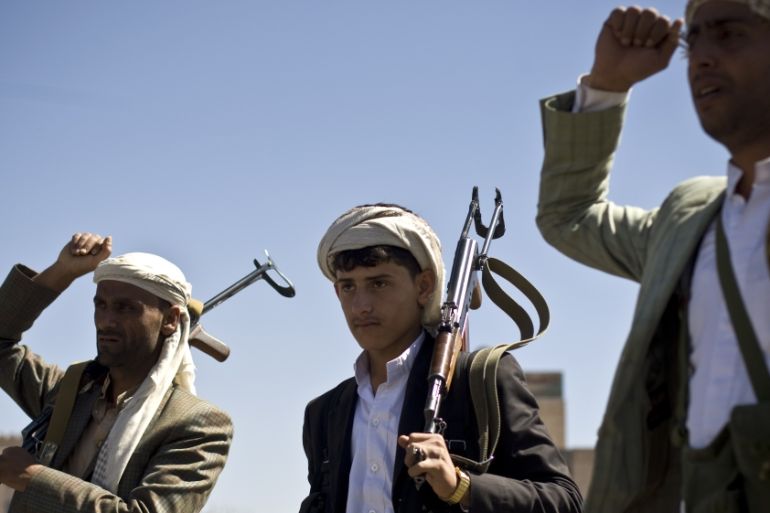Yemen coup: What happens now?
A number of scenarios could follow the Houthis’ takeover, from relative political stability to all-out civil war.

The Houthis issued their first military communiqué on Friday, putting another nail in the coffin of Yemen’s democratic transition.
The transitional period had lasted from February 2012 until September 21, 2014, when Houthi militias – with significant help from former President Ali Abdullah Saleh’s loyalists in the military – entered the capital, Sanaa. Since mid-January, the Houthis have challenged the state’s legitimacy by placing the president, the prime minister and other key ministers under house arrest, prompting a severe constitutional crisis and creating a significant void of government.
Keep reading
list of 4 itemsUS sanctions shipping firm accused of links to Iran, Yemen’s Houthis
Vessel struck in Red Sea as Houthis promise attacks on more shipping lanes
What we know about deadly Houthi attack on cargo ship
The diplomatic mission of the United Nations special envoy to Yemen, Jamal Benomar, failed to bring all political actors together in a last-minute attempt to avoid a unilateral political act from the Houthis, whose communiqué calls for the establishment of a five-member presidential council, the abolishment of parliament and the creation of a new legislative body. Abdel-Malik al-Houthi is now the de facto leader of Yemen.
The question now is what likely scenarios could follow the Houthis’ first military communiqué.
Political stability
From the Houthis’ perspective, the most optimistic scenario would be to convince the international community – with the support of former leader Ali Abdullah Saleh and his General People’s Congress – that they can bring political stability to the conflict-torn and poverty-stricken country. Two key premises are important in this scenario: that Saleh and the Houthis will maintain their alliance and have clear strategic plans for how to share power and rule Yemen, and that political opposition to the Houthis will remain weak and fragmented, facilitating their control of Yemen.
Deteriorating economic conditions in Yemen and the inability of Iran to support Yemen financially will allow the GCC, especially Saudi Arabia, to exert much more leverage in Yemen.
In this scenario, the ideological differences between the Houthis and Saudi Arabia would be irrelevant, especially given Saudi’s key support of the last Yemeni Zaydi imam during the 1960s civil war between Zaydi Royalists and Yemeni Republicans. The critical issue for Saudi back then was the preservation of Yemen’s monarchy and the defeat of republicanism and Arab nationalism.
The Houthis may now turn Yemen into a pseudo-monarchy with the Zaydi and Sayyid families controlling key government positions, which is consistent with the Saudi interest in avoiding a democratic Yemen. As long as the Houthis endorse the forceful elimination of al-Qaeda from Yemen, the United States will ignore the anti-political rhetoric and slogans of “Death to America” and “Death to Israel” borrowed from Hezbollah and Iran, instead assuming these sentiments are intended for domestic consumption to confer legitimacy on a Houthi-led Yemen.
Recognition withheld
The second-most optimistic scenario would be for the UN, the US and the Gulf Cooperation Council (GCC) to withhold recognition of the Houthi government and increase political pressure on the Houthis and Saleh to pursue a consensus agreement with other political actors, such as the opposition Joint Meeting Parties (JMPs), in order to avoid total isolation and confrontation with the international community. Deteriorating economic conditions in Yemen and the inability of Iran to support Yemen financially will allow the GCC, especially Saudi Arabia, to exert much more leverage in Yemen.
The success of this scenario would depend on the ability of Yemeni youth activists to rise up again, with the support of the JMPs, and form a broad domestic coalition for democratic transition. This scenario could inject new life into the now-dead Gulf Initiative for national unity, but with a clearer roadmap.
Collapsed alliance
A third possible scenario would be the collapse of the Saleh-Houthi alliance, which would likely result in a military confrontation between the two factions, with potential escalation depending on the responses of other political actors.
Civil war
The fourth scenario would be the worst possible scenario, involving the eruption of a severe civil war in Yemen and the inevitable fragmentation or separation of certain parts of the country.
The key premise of this scenario is that that the tribes of Marib, together with many anti-Houthi tribal leaders and forces such as the Hirak of the south (Mobility movement), would target and challenge Houthi control of Sanaa.
This scenario would depend on financial support of these tribes and other actors by anti-Iranian actors such as the new king of Saudi Arabia, who is very concerned about the increased Iranian influence in Yemen. Although this scenario could cause Yemen to follow the same unfortunate course as Iraq, there is yet hope that Yemeni wisdom will prevail and protect the country from total collapse.